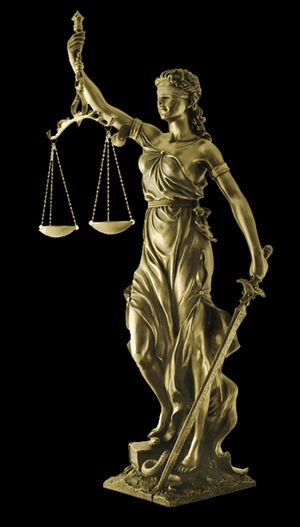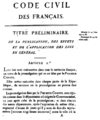Law facts for kids

The law is a set of rules that everyone in a country must follow. These rules are made by the government to help people live, work, and do business together peacefully. If someone breaks a law, police and courts can give them a punishment, like a fine (paying money) or even sending them to jail.
Long ago, leaders wrote laws to guide their people. Today, in most countries, laws are created and voted on by elected politicians in a special group called a legislature, like a parliament or congress. When you follow these rules, your actions are legal. If you break a rule, your actions are illegal.
A legal code is a written collection of laws that are enforced. This code often covers things like the police, courts, and how punishments are given. A lawyer is a professional who studies these rules and helps people understand them or argue cases in court. In some places, lawyers who write agreements are called "transactional attorneys," and those who go to court are called "litigators."
The Rule of law means that the government can only use its power in ways that both the government and the people have agreed upon. It limits the government's power, as set out in a country's constitution. The Rule of Law helps prevent dictatorships and protects people's rights. When leaders follow the laws fairly, even for themselves, it shows the rule of law is working. The ancient Greek thinker Aristotle said, "The rule of law is better than the rule of any individual."
Often, the ideas behind many laws come from a country's culture, including family and social traditions. In the past, and even today in some places, religion and religious books like the Bible or the Quran have been a big source of laws.
Contents
Different Kinds of Law
Laws are divided into different types, each dealing with specific areas of life.
- Contract law sets rules for agreements when people buy or sell things and services.
- Property law explains the rights and duties people have when they buy, sell, or rent homes and land (called real property), or objects (called personal property).
- Intellectual property (IP) law protects things people create, like art, music, and books. This is called copyright. It also protects new inventions, which is called a patent. It also covers the names of companies or special logos, known as a trademark.
- Trust law (often part of business law) sets rules for money put into investments, like pension funds for retirement.
- Tort law helps people get money (compensation) if someone hurts them or damages their property.
- Criminal law is used by the government to stop people from breaking laws and to punish those who do.
- Constitutional law deals with the important rights of the government and how it relates to the people. It mainly involves understanding a country's constitution, including how the different parts of government share power.
- Administrative law helps regular citizens challenge decisions made by the government. It also covers government rules and how government agencies work.
- International law sets rules for how countries act with each other in areas like trade, the environment, or military actions. The Geneva Conventions about how wars should be fought are an example.
- Custom and tradition are practices that are widely accepted in a society, even if they aren't written down. Sometimes, courts can enforce these customs, and they can be part of legal decisions.
Civil Law vs. Common Law
There are two main types of legal systems used around the world.
- Civil law is the most common legal system today. It is based on written laws found in constitutions or laws passed by the government. In civil law systems, judges usually have less power to create new laws, as most laws are made by elected politicians.
- Common law comes from England and is based on decisions made by judges in past court cases. It is used in many countries that were once part of the British Empire, including most of the United States. In common law systems, many laws are written by elected officials, but judges' past decisions also create important legal rules. Common law began in the Middle Ages, when King John of England signed the Magna Carta.
Religious Law
Religious law is based on religious beliefs or holy books. Examples include Halakha in Judaism, Sharia in Islam, and Canon law in Christianity.
For a long time, Sharia law was the main legal system in the Muslim world. Today, some Muslim countries, like Saudi Arabia and Iran, still base their entire legal system on Sharia law.
How Laws Are Made
The Legislature
In democracies, people choose politicians to represent them in a legislature. Famous legislatures include the Houses of Parliament in London, the Congress in Washington, D.C., and the Bundestag in Berlin. Most legislatures have two parts, often called a 'lower house' and an 'upper house'. To pass a new law, most politicians in both houses must vote for it. The legislature is the part of government that writes laws and decides if they will be approved.
The Judiciary
The judiciary is a group of judges who solve disagreements between people and decide if someone accused of a crime is guilty. In some places, judges guide a jury (a group of citizens) on how to understand the facts, and the jury then decides guilt or innocence based on the evidence. Most countries have a system of appeals courts, leading up to a highest court like a Supreme Court. These highest courts can often remove laws that go against the country's constitution.
The Executive (Government)
The executive is the part of government that carries out the laws and manages the country. In many democratic countries, the executive leaders are chosen from the legislature and form a group called the cabinet. In other countries, like France or the US, the executive branch has a President who is separate from the legislature.
The executive suggests new laws and handles relationships with other countries. It usually controls the military, the police, and government workers (bureaucracy). The executive also chooses ministers or secretaries to lead different government departments, like health or justice.
In some countries, the Head of State (like a King, Queen, or President) has a mostly ceremonial role and doesn't manage daily government. Their main legal job is to act as a check on the executive, with rare powers like dissolving the legislature or calling elections.
Other Parts of the Legal System
- The police enforce criminal laws by arresting people suspected of breaking them.
- Bureaucrats are government workers and organizations that do work for the government. They follow rules and make decisions in writing.
- Lawyers are people trained in laws. They advise people about their legal rights and duties and represent them in court. To become a lawyer, you usually need to finish a university law program and pass an exam. Lawyers work in law firms, for the government, for companies, or on their own.
- Civil society includes people and groups not part of the government who work to protect human rights, freedom of speech, and other individual rights. Examples include political parties, trade unions, human rights organizations, and charities.
Related pages
Images for kids
-
Iustitia ("Lady Justice") is a symbolic personification of the coercive power of a tribunal: a sword representing state authority, scales representing an objective standard and a blindfold indicating that justice should be impartial.
-
King Hammurabi is revealed the code of laws by the Mesopotamian sun god Shamash, also revered as the god of justice.
-
The Constitution of India is the longest written constitution for a country, containing 444 articles, 12 schedules, numerous amendments and 117,369 words.
-
Emperor Justinian (527–565) of the Byzantine Empire who ordered the codification of Corpus Juris Civilis.
-
First page of the 1804 edition of the Napoleonic Code.
-
The Chamber of the House of Representatives, the lower house in the National Diet of Japan.
-
The G20 meetings are composed of representatives of each country's executive branch.
-
The mandarins were powerful bureaucrats in imperial China (photograph shows a Qing dynasty official with mandarin square visible).
-
In civil law systems such as those of Italy, France, Germany, Spain and Greece, there is a distinct category of notary, a legally trained public official, compensated by the parties to a transaction. This is a 16th-century painting of such a notary by Flemish painter Quentin Massys.
-
A march in Washington, D.C., during the civil rights movement in 1963.
-
The Italian lawyer Sir Alberico Gentili, the Father of international law.
-
The "McLibel case" was the longest-running case in UK history. It involved publishing a pamphlet that criticised McDonald's restaurants.
-
A painting of the South Sea Bubble, one of the world's first ever speculations and crashes, led to strict regulation on share trading.
-
The New York Stock Exchange trading floor after the Wall Street Crash of 1929, before tougher banking regulation was introduced.
-
Richard Posner, University of Chicago Law School professor and the most cited legal scholar, until 2014 ran a blog with Bank of Sweden Prize winning economist Gary Becker.
-
Max Weber in 1917, Weber began his career as a lawyer, and is regarded as one of the founders of sociology and sociology of law.
See also
 In Spanish: Derecho para niños
In Spanish: Derecho para niños

























